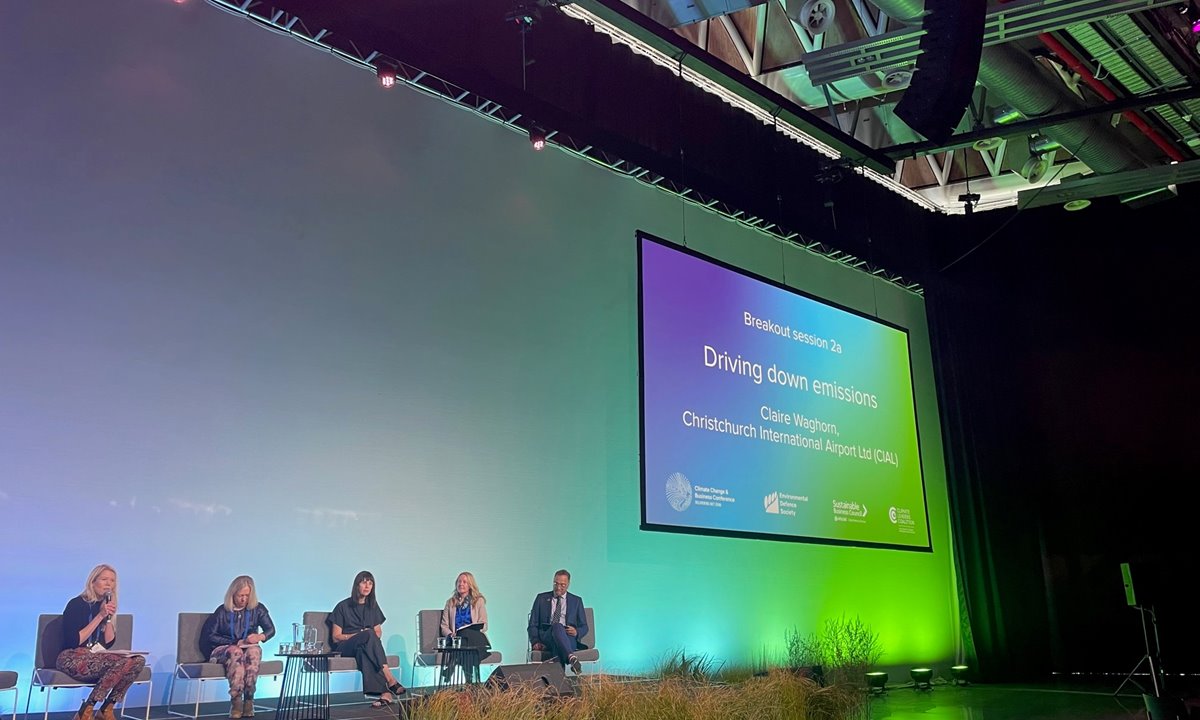Last week Te Waka attended the Climate Change & Business Conference 2023, the same week in which we saw both forest fires and flooding from extreme weather events in the South Island. The scale, frequency, and impact of extreme weather events here and around the world provided a confronting backdrop for the annual conference, which focussed this year on identifying effective adaptation pathways while maintaining momentum on achieving real emission reductions at pace.
Attending for the second year, Te Waka General Manager Economic Development Rosie Spragg shares her key reflections from the conference, with a focus on areas of opportunity for the Waikato:
We need to use all the tools in the toolbox, and we need to use them now
International keynote speaker Katharine Hayhoe set the tone and framework for the conference by comparing the global net zero transition process to an overflowing swimming pool. Her analogy was used to demonstrate a clear need for three fundamental actions to respond to the ‘overflow’ of carbon emissions:
• Adaptation: Learn how to swim
On emissions reduction, the need to actively support and incentivise industrial decarbonisation was a key focus throughout the conference. This lever links closely to the energy transition needed to support electrification as a key enabler of industrial decarbonisation. You can read more on the energy transition in our recent articles from the Wind Energy Summit 2023 here.
On sequestration, the opportunity and importance of taking a nature-based approach that embraces biodiversity was highlighted. This requires protection, restoration, and regeneration of ecosystems.
On adaptation, the conversation was wide ranging, spanning the equity challenges, the complexity of managing cumulative risks, and the importance of community engagement and bold leadership. A stark picture was painted of the scale of retreat that will be required in some parts of the country and the challenges we are likely to face in supporting communities through this transition.
With many speakers highlighting environmental indicators that suggest we are at or near tipping points, the consensus for action on all three levers was clear. There was acknowledgment throughout the conference on the need for a mix of tools to be used and the risks of over-reliance on a single mechanism to drive change. Many speakers drew attention to the importance of both demand and supply-side mechanisms, carrots and sticks (taxes and subsidies), and small and large-scale interventions.
We have the knowledge we need to lead
The conference sessions on agriculture and the Māori economy were particularly relevant for the Waikato region. It was encouraging to hear about opportunities to leverage knowledge we already hold to take meaningful action.
On agriculture, Alison Dewes spoke to the opportunity that exists in our top farmers, whose practices are already resulting in about 30% lower emissions and environmental impact than industry averages. These farmers have fewer, better fed, healthier cows that produce more milk solids per kilogram of body weight and have longer lifecycles. This improved efficiency and environmental impact is achieved through better and more varied nutrition, the provision of ample shade, retiring vulnerable landscapes on farm, and investment in regenerative approaches that prioritise soil health. The opportunity is to ‘shift the curve’ to improve the performance of average farms to that of the top 15%, and the Waikato is already home to leading farms we can learn from. This doesn’t require adoption of new technologies that do not yet exist or are not viable for use on farm – we can make meaningful change now and supplement this with technology as it emerges.
One of the most engaging sessions of the conference was focussed on the role of the Māori economy and Mātauranga Māori (traditional Māori knowledge) in supporting the transition to a low-emissions economy. The ‘quadruple bottom line’ of Māori business was referenced (people, planet, purpose, profit), which highlights the long-term mindset and central consideration of environmental outcomes as a core foundation of Māori business – a model that other businesses can learn from. In this session, Renata Blair spoke to the size of the ~$70 billion Māori economy and its heavy reliance on the primary sector, reflecting a strong connection to the land but also challenges with the associated high emissions footprint. The strong interest from Māori to invest in renewable energy was also discussed and is a topic we covered in our recent Wind Energy article here.
Central to this conversation (and highlighted by many presenters at the conference) is the opportunity to embrace Mātauranga Māori for solutions to our climate and environmental challenges. This was best summed up by the whakataukī shared during this session: Titiro whakamuri kia anga whakamua – look to the past in order to move forward. The panellists spoke to the journey of Māori to Aotearoa, which was driven by a need to adapt, and their experiences in acclimating to the very different environment of Aotearoa when they arrived. There is long history and deep knowledge of adaptation and natural ecosystems within Mātauranga Māori that has a valuable role to play in our response to climate change.
In leadership there is opportunity
A notable end to the conference was the energy with which Rod Carr, Chairperson for the Climate Change Commission, spoke to the “massive opportunity” that Aotearoa New Zealand has in responding to climate change. He emphasised that for many countries there is little upside relative to the challenges they face from climate change, and that we are in an enviable position globally. We can benefit from bold and fast action that helps to solve global problems and creates new industries and opportunities locally.



.jpg?sfvrsn=14164ce5_1&mode=crop&width=770&height=462&format=jpeg&quality=85)
.jpg?sfvrsn=414c0434_1&mode=crop&width=770&height=462&format=jpeg&quality=85)
.png?sfvrsn=16db4cf2_1&mode=crop&width=770&height=462&format=jpeg&quality=85)